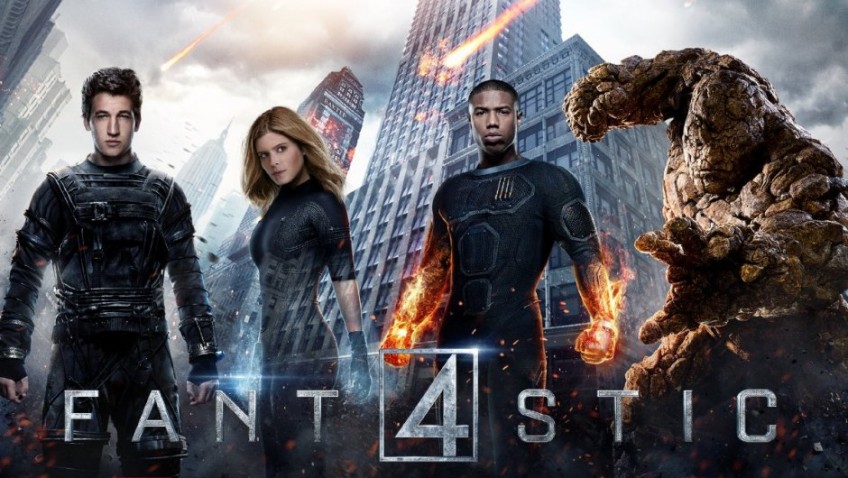Joyce Glasser reviews Fantastic Four
All these Marvel Comic spin-offs can get complicated, so here are the essential facts. This 2015 release entitled Fantastic Four is the third theatrical film to be released based on Stan Lee and Jack Kirby’s original comics. Some of the characters from Fantastic Four, or at least their powers, have found their way into other films, notably X-Men and the Avengers (e.g. Wanda and Quicksilver and The Thing – a form of the Hulk).
Fantastic Four: Rise of the Silver Surfer, released in 2007, has nothing to do with older people playing around on the internet, and, despite making money Twentieth Century Fox, axed the planned sequel. The 2015 Fantastic Four is therefore a ‘reboot’ of the whole franchise, showing how the four young applied science geniuses got together and explaining the origins of their powers.
One of the three writers of the current screenplay is British-born Ivy League Magna Cum Laude and Columbia University MFA graduate Simon Kinberg, who wrote the scripts for the Brangelina film Mr and Mrs Smith and was a co-writer on Guy Ritchie’s popular Sherlock Holmes. The director and third co-writer is Josh Trank, now 31, whose debut feature, Chronicle, from 2011, made him the youngest director in history to open a film at number one at the US box office. So Fantastic Four is not terrible, but why it’s not fantastic or even good, is more about showbiz than talent. More on that later.
The film gets off to a slow start, but that’s not such a bad thing for a reboot. There is plenty of time to set up the main characters, childhood friends Reed Richards (Miles Teller) and Ben Grimm (Jamie Bell). They are both loners, but, as children, Reed is a nerd while Ben is the misunderstood tough-guy son of the local junk yard dealers. A junk yard for Reed is like a sweet shop for most kids since he wants to build a teleportation machine.
Seven years jump by and we find the two young men demonstrating their teleporting machine at a science fair. Their project is unjustly disqualified following a demonstration, but Dr Franklin Storm (Reg E Cathey) of the Baxter Foundation recognises a work of genius when he sees one and gives Reed a scholarship (just to what, is not made clear as he seems to know everything).
While Ben goes home to his junk yard, Reed is given everything he needs to build a prototype machine. Dr Storm has one natural child, Johnny (Michael B Jordan) who prefers squandering his DIY talents in illegal hot-rod races to working for his dad, but is eventually brought into the fold. Storm (who is black) also has an adopted daughter, the brainy, blond Sue. Storm realises he needs the brilliant mind of the disillusioned ideologue Victor von Doom (Toby Kebbell) and lures the former student back by confirming that Sue, the only person Victor trusts and loves, will be there. Victor is jealous, however, when he sees Reed with Sue, which does not bode well for the project.
When NASA officials witness the miraculous success (with a hapless chimp in the module) of the machine, Franklin Storm’s boss, the money man Dr Harvey Allen (Tim Blake Nelson) dismisses the young creators with patronising thanks and arranges for professional astronauts to fly the machine. The friends are furious at their betrayal (only Victor is not surprised) and devise a quick plan to beat the money men to it with a quickie trip. Once again we have the stereotypical scenario in which the demonic oldies take credit for the creative talent of the young.
Just when the real action is to start, the clarity of the first third of the film disappears. Why don’t the three young men invite Sue along? Why does Reed insist on delaying the departure by inviting Ben when Ben has had no training for the past year and no space suit? (We specifically hear that Sue has been custom making the group’s space suits). They are going to a parallel dimension called Planet Zero, but don’t they need provisions and isn’t it necessary to have a team at the controls at the Baxter Foundation?
The quartets’ transformations appear haphazard and introduce a very dark tone to the film. Victor is lost to Planet Zero, an inhospitable, mountainous place bubbling with radiation gases. The others, including Sue (via the controls) awaken — miraculously, back in some military complex – with gross deformities, deemed special powers, that the cynical Harvey Allen wants to harness and sell to the military.
Forget about giving the poor kids psychological therapy, Sue is now the Invisible Woman who can manipulate force fields and give her colleagues a ride through space in her bubble. Johnny (the speed demon) becomes the human torch; Ben, who was buried under rubble, becomes the Thing (a Hulk that cannot revert to human form), and Reed finds he has rubber arms and legs that can extend like Spider Man’s. Victor comes back to destroy his former colleagues and Planet Earth. He is stronger than any one of his colleagues but, as Reed says, ‘not stronger than all of us’, realises that there is power in friends sticking together.
The real story is equally familiar. It is the story of what happens when a young auteur turns his $12 million debut Sci-Fi feature (Chronicle) into a $125 million box office and critical hit and then sells his soul to the devil. What happened when Trank was given a budget of $120 million was the opposite of what Twentieth Century Fox and all the producers thought would happen.
Not only does Fantastic Four not look like it cost $120 million, but it has not turned a profit. Miles Teller, looking to expand his career after the Oscar nominated Whiplash, has set it back a pace. The media praise for Chronicle has turned into a media bashing for Trank’s new film. Apparently Trank had a vision for the film (and we must believe him), but whatever that was, seriously diluted. It seems that the more money there is in the budget, the less independence for a young, sophomore director. If we want to speculate on the matter we could say that like Reed, Trank’s project was taken away from him by the money men (and concerns about future Marvel Comic tie-ins) and the hapless young creator was left the victim.




